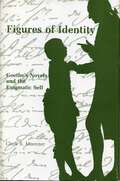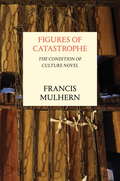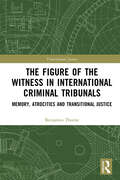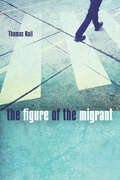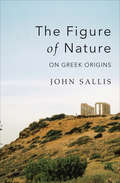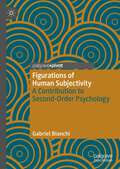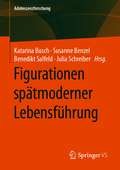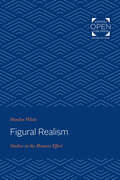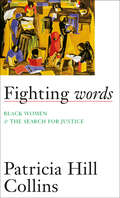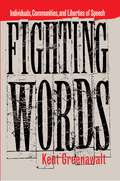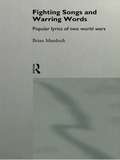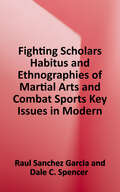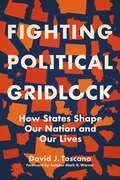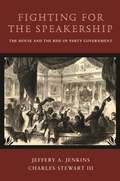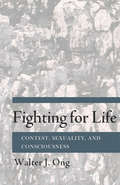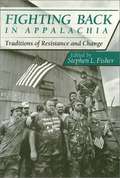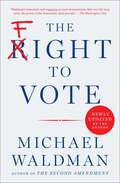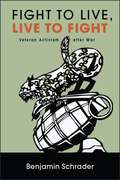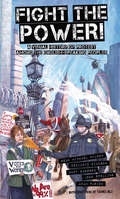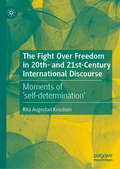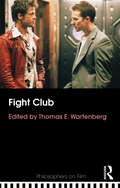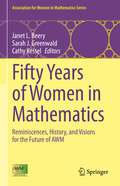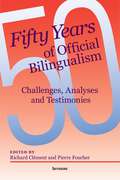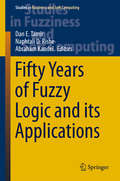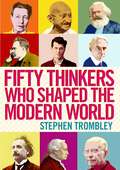- Table View
- List View
Figures of Identity: Goethe’s Novels and the Enigmatic Self (G - Reference, Information and Interdisciplinary Subjects)
by Clark S. MuenzerThe question of coherence in Goethe's novels, which, like Faust, compelled his attention throughout his creative life, has only recently occupied a few critics. Professor Muenzer's study offers the most comprehensive effort of this kind by examining the problematic nature of self-definition through the four novels and its emergence as a discursive process of the imagination.The self of these texts, Muenzer suggests, evolves as a symbolic construct that records a patter of pursuit for each of their protagonists and orients the reader toward three basic goals of human aspiration. Thus, Werther aspires to purposefulness as a center of teleological fulfillment, while the hero of Wilhelm Meister's Apprenticeship refers to an ideological center of participation in his social desire. Eduard, in The Elective Affinities, presumes to occupy a center of archaeological power through his typically self-assertive strategies.In the last of his novels, Wilhelm Meister's Journeymanship, Goethe articulates the need to balance all such self-involved behavior with an attitude of self-denial. Apparently, the mind can orient itself through centers of purpose, order, and power, but it must also recognize the illusion of their attainment. Identity does not involve a substantive presence, and the result of self-definition for Goethe is interpretive work.Each of Professor Muenzer's interpretations has been guided by this premise. The interests of all of Goethe's novelistic protagonists, he concludes, "serve as orienting postures toward goals that cannot be literally achieved." Consequently, symbolic resolutions are proposed. These then introduce new problems as points of departure in subsequent works. The hidden agenda of Goethe's work as a novelist is a self that exists as a textual problem, a series of interpretive moves that endlessly defer the attainment of self presence by supplementing each other in narrative fictions.
Figures of Catastrophe
by Francis MulhernA bold new vision of the modern English novelThe leading critic Francis Mulhern uncovers a hidden history in the fiction of the past century, identifying a central new genre: the condition of culture novel. Reading across and against the grain of received patterns of literary association, tracing a line from Hardy and Forster, through Woolf, Waugh and Bowen, to Barstow, Fowles, Rendell, Naipaul, Amis, Kureishi and Smith, he elucidates the recurring topics and narrative logics of the genre, showing how culture emerges as a special ground of social conflict, above all between classes. The narrative evaluations of culture's ends--the aspirations and the destinies of those whose lives are the subject of these novels--grow steadily darker over time, and the writing itself grows more introverted.A concluding discussion elicits the characteristics of the English condition of culture novel, in an international setting, and closes in, finally, on the central conundrum of the genre: its uncanny reprise, in its own plane, of the historical arc of the modern labour movement in Britain, from its beginnings in the late nineteenth century through its post-war heyday to the seemingly inexorable decline of recent decades.From the Hardcover edition.
The Figure of the Witness in International Criminal Tribunals: Memory, Atrocities and Transitional Justice
by Benjamin ThorneThis book analyses how international criminal institutions, and their actors – legal counsels, judges, investigators, registrars – construct witness identity and memory. Filling an important gap within transitional justice scholarship, this conceptually led and empirically grounded interdisciplinary study takes the International Criminal Tribunal for Rwanda (ICTR) as a case study. It asks: How do legal witnesses of human rights violations contribute to memory production in transitional post-conflict societies? Witnessing at tribunals entails individuals externalising memories of violations. This is commonly construed within the transitional justice legal scholarship as an opportunity for individuals to ensure their memories are entered into an historical record. Yet this predominant understanding of witness testimony fails to comprehend the nature of memory. Memory construction entails fragments of individual and collective memories within a contestable and contingent framing of the past. Accordingly, the book challenges the claim that international criminal courts and tribunals are able to produce a collective memory of atrocities; as it maintains that witnessing must be understood as a contingent and multi-layered discursive process. Contributing to the specific analysis of witnessing and memory, but also to the broader field of transitional justice, this book will appeal to scholars and practitioners in these areas, as well as others in legal theory, global criminology, memory studies, international relations, and international human rights.
The Figure of the Migrant
by Thomas NailThis book offers a much-needed new political theory of an old phenomenon. The last decade alone has marked the highest number of migrations in recorded history. Constrained by environmental, economic, and political instability, scores of people are on the move. But other sorts of changes--from global tourism to undocumented labor--have led to the fact that to some extent, we are all becoming migrants. The migrant has become the political figure of our time. Rather than viewing migration as the exception to the rule of political fixity and citizenship, Thomas Nail reinterprets the history of political power from the perspective of the movement that defines the migrant in the first place. Applying his "kinopolitics" to several major historical conditions (territorial, political, juridical, and economic) and figures of migration (the nomad, the barbarian, the vagabond, and the proletariat), he provides fresh tools for the analysis of contemporary migration.
The Figure of Nature: On Greek Origins (Studies in Continental Thought)
by John SallisBroaching an understanding of nature in Platonic thought, John Sallis goes beyond modern conceptions and provides a strategy to have recourse to the profound sense of nature operative in ancient Greek philosophy. In a rigorous and textually based account, Sallis traces the complex development of the Greek concept of nature. Beginning with the mythical vision embodied in the figure of the goddess Artemis, he reanimates the sense of nature that informs the fragmentary discourses of Anaximenes, Heraclitus, Parmenides, and Empedocles and shows how Plato takes up pre-Socratic conceptions critically while also being transformed. Through Sallis's close reading of the Theaetetus and the Phaedo, he recovers the profound and comprehensive concept of nature in Plato's thought.
Figurations of Human Subjectivity: A Contribution to Second-Order Psychology
by Gabriel BianchiThis book takes an empirically grounded perspective on research in values, intimacy and sexuality, among other topics in psychology, to highlight the importance of searching for human subjectivity in its diversity, plurality and self-generativity. The author conducts an in-depth discussion on the methodological and epistemological issues enabling the study of subjectivity, and argues that in order to improve the contribution of psychology to human knowledge, a study of subjectivity must be at the forefront.This book presents a critical reflection of the author’s decades-long research within psychology to argue for a significant paradigm shift in the conception and execution of psychological research: a shift to “second order psychology”.
Figurationen spätmoderner Lebensführung (Adoleszenzforschung #10)
by Katarina Busch Susanne Benzel Benedikt Salfeld Julia SchreiberDer Band versammelt Beiträge, die sich dem Konnex von Psyche und Gesellschaft widmen, wie er auch im Zentrum der Arbeiten von Benigna Gerisch und Vera King steht. Anhand unterschiedlicher Themen wie Adoleszenz, Migration, Alter, Geschlecht und Generationenverhältnisse werden verschiedene Dimensionen spätmoderner Lebensführung beleuchtet. Übergreifend wird so der Frage nachgegangen, wie das Ineinandergreifen von psychischen und sozialen Dynamiken untersucht und verstanden werden kann.
Figural Realism: Studies in the Mimesis Effect
by Hayden WhiteOriginally published in 1998. In his earlier books such as Tropics of Discourse and The Content of the Form, Hayden White focused on the conventions of historical writing and on the ordering of historical consciousness. In Figural Realism, White collects eight interrelated essays primarily concerned with the treatment of history in recent literary critical discourse. "'History' is not only an object we can study," writes White, "it is also and even primarily a certain kind of relationship to 'the past' mediated by a distinctive kind of written discourse. It is because historical discourse is actualized in its culturally significant form as a specific kind of writing that we may consider the relevance of literary theory to both the theory and the practice of historiography."
Fighting Words: Black Women And The Search For Justice (Contradictions Of Modernity Series #Volume Seven)
by Patricia Hill CollinsA professor of sociology explores how black feminist thought confronts the injustices of poverty and white supremacy, and argues that those operating outside the mainstream emphasize sociological themes based on assumptions different than those commonly accepted.
Fighting Words: Individuals, Communities, and Liberties of Speech
by Kent GreenawaltShould "hate speech" be made a criminal offense, or does the First Amendment oblige Americans to permit the use of epithets directed against a person's race, religion, ethnic origin, gender, or sexual preference? Does a campus speech code enhance or degrade democratic values? When the American flag is burned in protest, what rights of free speech are involved? In a lucid and balanced analysis of contemporary court cases dealing with these problems, as well as those of obscenity and workplace harassment, acclaimed First Amendment scholar Kent Greenawalt now addresses a broad general audience of readers interested in the most current free speech issues.
Fighting Songs and Warring Words: Popular Lyrics of Two World Wars
by Brian MurdochFirst published in 1990. Routledge is an imprint of Taylor & Francis, an informa company.
Fighting Scholars: Habitus and Ethnographies of Martial Arts and Combat Sports (Key Issues In Modern Sociology Ser.)
by Raul Sanchez Garcia Dale C. SpencerFighting Scholars brings to the fore the ethnographic study of combat sports and martial arts as a means of exploring embodied human existence. The book's main claim is that such activities represent privileged grounds to access different social dimensions, such as emotion, violence, pain, gender, ethnicity and religion. To explore these dimensions, the concept of 'habitus' is presented prominently as an epistemic remedy for the academic distant gaze of the effaced academic body. The different contributions of this volume are aligned within the same project that began to crystallize in Loïc Wacquant's 'Body and Soul': the construction of a 'carnal sociology' that constitutes an exploration of the social world 'from' the body. The book is divided into three sections. In the first section, the editors introduce the field, providing a typology of existing literature. The second section contains the contributions of the authors, discussing their respective approaches to embodied ethnography, their use of the concept of 'habitus', and ethnographic findings. The third section contains a conclusion by the editors - reflecting on existing conceptions of 'habitus' and interdisciplinary possibilities for rethinking the concept - and an epilogue by Loïc Wacquant critically assessing the whole volume.
Fighting Political Gridlock: How States Shape Our Nation and Our Lives
by David J. ToscanoIn this profoundly polarized era, the nation has been transfixed on the politics of Washington and its seemingly impenetrable gridlock. Many of the decisions that truly affect people’s lives, however, are being made not on the federal level but in the states. Faced with Washington’s political standoff, state governments are taking action on numerous vital issues, often impacting citizens and their communities far more than the decision makers in D.C. Despite this, few Americans really understand their state governments or the issues they address. In Fighting Political Gridlock, David Toscano reveals how the states are working around the impasse in Washington and how their work is increasingly shaping society.Long a central figure in one of the most important legislative bodies in the nation, the Virginia House of Delegates, Toscano brings a unique expertise to this urgent and timely discussion. Beginning with an analysis of state responses to COVID-19, including the processes and consequences of declaring states of emergency, he goes on to detail how various states are attacking issues in different ways–from education and voting to criminal justice and climate change–and provides a broad overview of how state actions affect our system of federalism. Toscano concludes with a call to action and civic engagement, including suggestions for how citizens and public officials can revitalize American democracy.
Fighting for the Speakership: The House and the Rise of Party Government (Princeton Studies in American Politics: Historical, International, and Comparative Perspectives #131)
by Jeffery A. Jenkins Charles StewartThe Speaker of the House of Representatives is the most powerful partisan figure in the contemporary U.S. Congress. How this came to be, and how the majority party in the House has made control of the speakership a routine matter, is far from straightforward. Fighting for the Speakership provides a comprehensive history of how Speakers have been elected in the U.S. House since 1789, arguing that the organizational politics of these elections were critical to the construction of mass political parties in America and laid the groundwork for the role they play in setting the agenda of Congress today. Jeffery Jenkins and Charles Stewart show how the speakership began as a relatively weak office, and how votes for Speaker prior to the Civil War often favored regional interests over party loyalty. While struggle, contention, and deadlock over House organization were common in the antebellum era, such instability vanished with the outbreak of war, as the majority party became an "organizational cartel" capable of controlling with certainty the selection of the Speaker and other key House officers. This organizational cartel has survived Gilded Age partisan strife, Progressive Era challenge, and conservative coalition politics to guide speakership elections through the present day. Fighting for the Speakership reveals how struggles over House organization prior to the Civil War were among the most consequential turning points in American political history.
Fighting for Life: Contest, Sexuality, and Consciousness
by Walter J. OngWhat accounts for the continued popularity of the macho image, the fanaticism of sports enthusiasts, the perennial appeal of Don Quixote's ineffectual struggles? Walter J. Ong addresses these and related questions as he offers new insights into the complex ways in which human life is affected by contest. Ong argues that the struggle for dominance, which he feels is crucial among higher animal species, is more immediately critical for males than for females, helping males to manage persistent insecurity and to establish sexual identity. The male agonistic drive finds an outlet in contests as diverse as football, cockfighting, and chess--the last, the ultimate intellectualization of formalized territorial combat. Demonstrating the importance of contest in biological evolution and in the growth of consciousness out of the unconscious, Ong shows how adversarial today's shifting patterns of contest in such arenas as spectator sports, politics, business, religion, academe, and the history of rhetoric. Human internalization of agonistic drives, he concludes, can foster the deeper discovery of the self and of distinctively human freedom.
Fighting Back in Appalachia: Traditions of Resistance and Change
by Stephen L. FisherEssays explore various forms of resistance in Appalachia including community organizing and labor unions.
The Fight to Vote
by Michael WaldmanPraised by the late John Lewis, this is the seminal book about the long and ongoing struggle to win voting rights for all citizens by the president of The Brennan Center, the leading organization on voter rights and election security, now newly revised to describe today&’s intense fights over voting.As Rep. Lewis said, and recent events in state legislatures across the country demonstrate, the struggle for the right to vote is not over. In this &“important and powerful&” (Linda Greenhouse, former New York Times Supreme Court correspondent) book Michael Waldman describes the long struggle to extend the right to vote to all Americans. From the writing of the Constitution, and at every step along the way, as disenfranchised Americans sought this right, others have fought to stop them. Waldman traces this history from the Founders&’ debates to today&’s many restrictions: gerrymandering; voter ID laws; the flood of dark money released by conservative organizations; and the concerted effort in many state legislatures after the 2020 election to enact new limitations on voting.Despite the pandemic, the 2020 election had the highest turnout since 1900. In this updated edition, Waldman describes the nationwide effort that made this possible. He offers new insights into how Donald Trump&’s false claims of fraud—&“the Big Lie&”—led to the January 6 insurrection and the fights over voting laws that followed one of the most dramatic chapters in the story of American democracy.As Waldman shows, this fight, sometimes vicious, has always been at the center of American politics because it determines the outcome of the struggle for power. The Fight to Vote is &“an engaging, concise history…offering many useful reforms that advocates on both sides of the aisle should consider&” (The Wall Street Journal).
Fight to Live, Live to Fight: Veteran Activism after War (SUNY series in New Political Science)
by Benjamin SchraderWhile veterans are often cast as a "problem" for society, Fight to Live, Live to Fight challenges this view by focusing on the progressive, positive, and productive activism that veterans engage in. Benjamin Schrader weaves his own experiences as a former member of the American military and then as a member of the activist community with the stories of other veteran activists he has encountered across the United States. An accessible blend of political theory, international relations, and American politics, this book critically examines US foreign and domestic policy through the narratives of post-9/11 military veterans who have turned to activism after having exited the military. Veterans are involved in a wide array of activism, including but not limited to antiwar, economic justice, sexual violence prevention, immigration issues, and veteran healing through art. This is an accessible, captivating, and engaging work that may be read and appreciated not just by scholars, but also students and the wider public.
Fight the Power!
by Sean Michael Wilson Polyp Benjamin Dickson Hunt Emerson Adam PasionThis book visualises key moments in history where ordinary people have risen up and fought governments, corporations, even empires. When the 99% have stood up to combat exploitation and abuse or in pursuit of freedom of action and a better life. In other words, to show times in history, when people have struggled forward to FIGHT THE POWER!
The Fight Over Freedom in 20th- and 21st-Century International Discourse: Moments of ‘self-determination’
by Rita Augestad KnudsenThis book shows how international discourse citing ‘self-determination’ over the last hundred years has functioned as a battleground between two ideas of freedom: a ‘radical’ idea of freedom, and a ‘liberal-conservative’ idea of freedom. The book examines each of the major moments in which ‘self-determination’ has been a central part of the language of high-level international politics and law: the early 20th century discourse of V.I. Lenin and U.S. President Woodrow Wilson, the aftermath of the First World War and the formulation of the UN Charter, the 1950-1960s UN debates on ‘self-determination’, and the 2008-2010 International Court of Justice case on Kosovo’s declaration of independence. At each of these moments in history, ‘self-determination’ was at the top of the international agenda. And at each moment, a fight over the meaning of freedom played out in ‘self-determination’ discourse. Besides providing insights into the historical times in which self-determination was prominently cited internationally, the book offers a recasting and renewal of international debates on freedom in international discourse.
Fight Club (Philosophers on Film)
by Thomas E. WartenbergReleased in 1999, Fight Club is David Fincher’s popular adaption of Chuck Palahniuk’s cult novel, and one of the most philosophically rich films of recent years. This is the first book to explore the varied philosophical aspects of the film. Beginning with an introduction by the editor that places the film and essays in context, each chapter explores a central theme of Fight Club from a philosophical perspective. Topics discussed include: Fight Club, Plato’s cave and Descartes’ cogito moral disintegration identity, gender and masculinity visuals and narration. Including annotated further reading at the end of each chapter, Fight Club is essential reading for anyone interested in the film, as well as those studying philosophy and film studies.
Fifty Years of Women in Mathematics: Reminiscences, History, and Visions for the Future of AWM (Association for Women in Mathematics Series #28)
by Cathy Kessel Janet L. Beery Sarah J. GreenwaldThe Assocation for Women in Mathematics (AWM), the oldest organization in the world for women in mathematics, had its fiftieth anniversary in 2021. This collection of refereed articles, illustrated by color photographs, reflects on women in mathematics and the organization as a whole. Some articles focus on the situation for women in mathematics at various times and places, including other countries. Others describe how individuals have shaped AWM, and, in turn, how the organization has impacted individuals as well as the broader mathematical community. Some are personal stories about careers in mathematics. Fifty Years of Women in Mathematics: Reminiscences, History, and Visions for the Future of AWM covers a span from AWM’s beginnings through the following fifty years. The volume celebrates AWM and its successes but does not shy away from its challenges.The book is designed for a general audience. It provides interesting and informative reading for people interested in mathematics, gender equity, or organizational structures; teachers of mathematics; students at the high school, college, and graduate levels; and members of more recently established organizations for women in mathematics and related fields or prospective founders of such organizations.
Fifty Years of Official Bilingualism: Challenges, Analyses and Testimonies
by Richard ClémentFifty years ago, the Royal Commission on Bilingualism and Biculturalism published its final report. The result of innovative research and public consultations across the country, this report, replete with data and concepts, sets the stage for a comprehensive policy on official bilingualism, which would profoundly and indelibly change the face of Canada. The resolve to affirm the officially bilingual character of the country was met with the equally fervent determination to make French the common language of Quebecers. This book provides a critical view of the content and the consequences of the report. It is the outcome of a series of conferences held across the country in 2013, which explored the impact of these two aspects. It combines analyses of the Commission's activities, its main players, and the specific content of certain volumes of the report. The book is divided into three parts: the first outlines the progress accomplished since the publication of the report and contributors' views of the challenges which continue to create controversy; the second part provides analyses and studies of topics covered by the Commission, effectively demonstrating how far things have evolved; and the third features testimonials, including a fascinating conversation between the first Commissioner for Official Languages, Keith Spicer, and the Commissioner in office at the time of publication, Graham Fraser.
Fifty Years of Fuzzy Logic and its Applications
by Dan E. Tamir Naphtali D. Rishe Abraham KandelThis book presents a comprehensive report on the evolution of Fuzzy Logic since its formulation in Lotfi Zadeh's seminal paper on "fuzzy sets," published in 1965. In addition, it features a stimulating sampling from the broad field of research and development inspired by Zadeh's paper. The chapters, written by pioneers and prominent scholars in the field, show how fuzzy sets have been successfully applied to artificial intelligence, control theory, inference, and reasoning. The book also reports on theoretical issues; features recent applications of Fuzzy Logic in the fields of neural networks, clustering, data mining and software testing; and highlights an important paradigm shift caused by Fuzzy Logic in the area of uncertainty management. Conceived by the editors as an academic celebration of the fifty years' anniversary of the 1965 paper, this work is a must-have for students and researchers willing to get an inspiring picture of the potentialities, limitations, achievements and accomplishments of Fuzzy Logic-based systems.
Fifty Thinkers Who Shaped the Modern World
by Stephen TrombleyThe development of modern thought is traced through a sequence of accessible profiles of the most influential thinkers in every domain of intellectual endeavor since 1789No major representative of post-Enlightenment thought escapes Trombley's attention in this history: the German idealists Kant, Fichte, Schelling, and Hegel; the utilitarians Bentham and Mill; the transcendentalists Emerson and Thoreau; Kierkegaard and the existentialists; founders of new fields of inquiry such as Weber, Durkheim, and C.S. Peirce; the analytic philosophers Russell, Moore, Whitehead, and Wittgenstein; political leaders from Mohandas K. Gandhi to Adolf Hitler; and—last but not least—the four shapers-in-chief of our modern world: the philosopher, historian, and political theorist Karl Marx; the naturalist Charles Darwin, proposer of the theory of evolution; Sigmund Freud, the father of psychoanalysis; and the theoretical physicist Albert Einstein, begetter of the special and general theories of relativity and founder of post-Newtonian physics. This book offers a crisp analysis of their key ideas, and in some cases a reevaluation of their importance as we proceed into the 21st century.
